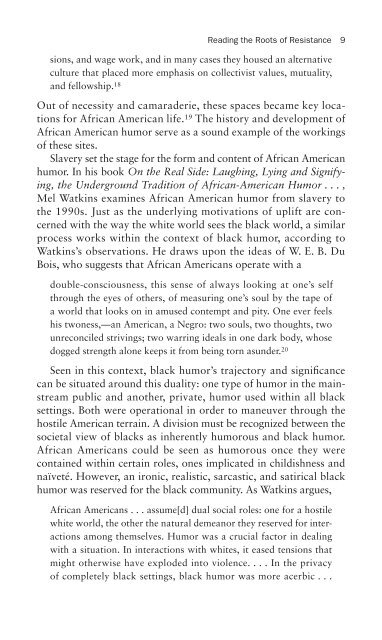Revolution Televised.pdf
Revolution Televised.pdf
Revolution Televised.pdf
You also want an ePaper? Increase the reach of your titles
YUMPU automatically turns print PDFs into web optimized ePapers that Google loves.
Reading the Roots of Resistance 9<br />
sions, and wage work, and in many cases they housed an alternative<br />
culture that placed more emphasis on collectivist values, mutuality,<br />
and fellowship. 18<br />
Out of necessity and camaraderie, these spaces became key locations<br />
for African American life. 19 The history and development of<br />
African American humor serve as a sound example of the workings<br />
of these sites.<br />
Slavery set the stage for the form and content of African American<br />
humor. In his book On the Real Side: Laughing, Lying and Signifying,<br />
the Underground Tradition of African-American Humor . . . ,<br />
Mel Watkins examines African American humor from slavery to<br />
the 1990s. Just as the underlying motivations of uplift are concerned<br />
with the way the white world sees the black world, a similar<br />
process works within the context of black humor, according to<br />
Watkins’s observations. He draws upon the ideas of W. E. B. Du<br />
Bois, who suggests that African Americans operate with a<br />
double-consciousness, this sense of always looking at one’s self<br />
through the eyes of others, of measuring one’s soul by the tape of<br />
a world that looks on in amused contempt and pity. One ever feels<br />
his twoness,—an American, a Negro: two souls, two thoughts, two<br />
unreconciled strivings; two warring ideals in one dark body, whose<br />
dogged strength alone keeps it from being torn asunder. 20<br />
Seen in this context, black humor’s trajectory and significance<br />
can be situated around this duality: one type of humor in the mainstream<br />
public and another, private, humor used within all black<br />
settings. Both were operational in order to maneuver through the<br />
hostile American terrain. A division must be recognized between the<br />
societal view of blacks as inherently humorous and black humor.<br />
African Americans could be seen as humorous once they were<br />
contained within certain roles, ones implicated in childishness and<br />
naïveté. However, an ironic, realistic, sarcastic, and satirical black<br />
humor was reserved for the black community. As Watkins argues,<br />
African Americans . . . assume[d] dual social roles: one for a hostile<br />
white world, the other the natural demeanor they reserved for interactions<br />
among themselves. Humor was a crucial factor in dealing<br />
with a situation. In interactions with whites, it eased tensions that<br />
might otherwise have exploded into violence. . . . In the privacy<br />
of completely black settings, black humor was more acerbic . . .

















